This is the text of the sermon I delivered on Sunday, August 25, 2013. I offer it here today (with slight modifications) in honor of the 50th anniversary of the March on Washington for Jobs and Freedom. The scripture passage for this sermon is Acts 11.1-18
This Wednesday marks the 50th anniversary of the March of Washington for Jobs and Freedom.
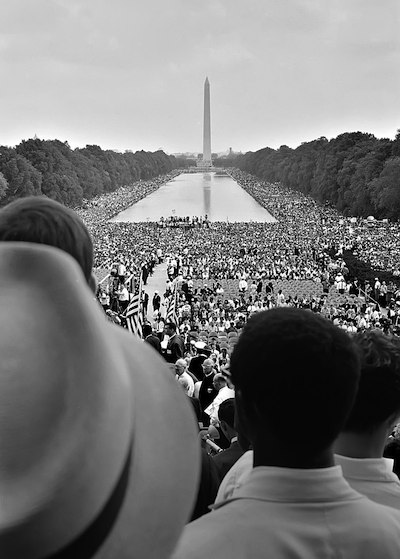
It was the biggest event Washington had ever seen. People from all over the country, some 250,000 in all, descended on the National Mall on a hot, muggy day in the summer of 1963. Students, activists, clergy, laity, the famous, the anonymous – all merging together like a mighty stream. Bob Dylan sang, as did Joan Baez and Mahalia Jackson. There were at least ten speakers on the program, but of course the one we remember most was the final speaker, Dr. Martin Luther King, Jr., who told the nation (indeed told the world) about a dream he had.
In the speech, which is one of the most famous speeches ever delivered by any man in any century; a speech that is as much a part of our national consciousness as the Declaration of Independence and the Preamble to the Constitution, King says his dream is deeply rooted in the American dream. It is a dream that one day this nation will rise up and live out the true meaning of its creed: we hold these truths to be self-evident that all men are created equal…I have a dream.
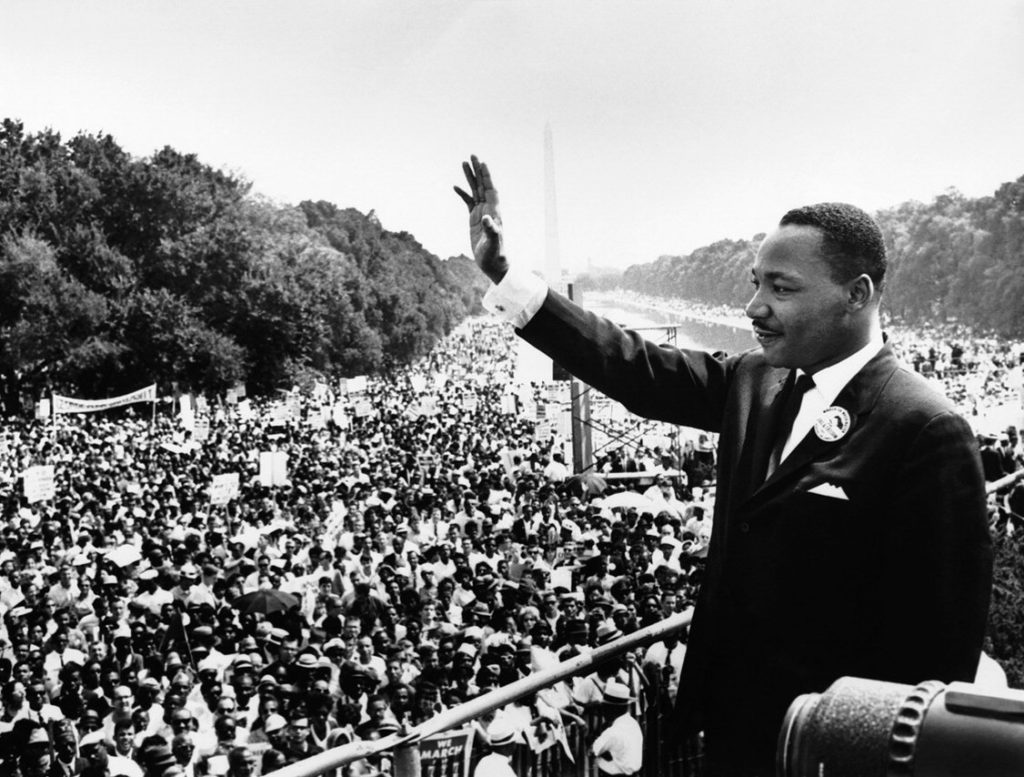
I have a dream, he said, that one day on the red hills of Georgia, the sons of former slaves and the sons of former slave owners will be able to sit down together at the table of brotherhood…. I have a dream.
I have a dream, he said, that one day all of God’s children – black men and white men, Jews and Gentiles, Protestants and Catholics, will be able to join hands and sing in the words of the old Negro spiritual, “Free at last, free at last, thank God Almighty we are free at last!”
I want to suggest today that Martin’s dream is also rooted in another dream, a dream much higher, much wider, and much older than the American dream: God’s dream. A dream for God’s people. A dream for the Church. A dream for all humanity. A dream embodied in the person of Christ Jesus, manifested through the work of the Holy Spirit, and encapsulated in a vision imparted to the Apostle Peter on a rooftop in Joppa in the mid-first century.
“Martin’s dream is also rooted in another dream, a dream much higher, much wider, and much older than the American dream: God’s dream. A dream for God’s people. A dream for the Church. A dream for all humanity. “
Today’s passage is the cap to our month-long look at the book of Acts (though really we’ve touched on a mere five chapters). Throughout, we’ve seen the Holy Spirit moving and pushing – pushing the gospel further, pushing people further, and pushing the envelope further.
The word I’ve used over and over to describe this process is reorientation.The reality of the Risen Christ and the coming of the Holy Spirit mean the magnetic poles of creation have shifted. What used to be North isn’t North anymore. Everything has to be reoriented. Everything.We’ve seen passions redirected (Saul of Tarsus), opportunism confronted (Simon the Magician), and comfort zones stretched to the breaking point (Philip and the Ethiopian Eunuch).
Today, in this vision (this dream) given to the Apostle Peter, the Holy Spirit challenges what may be the most difficult thing of all to redirect and reorient. The Holy Spirit challenges Peter’s piety – or, at least, an element of it: a life-long habit, a life-long belief with roots anchored in his heart, in the depths of his soul.
Peter sees this thing, like a great sheet, lowered from heaven. On it are four-footed animals, beasts of prey, reptiles, and birds of the air. He then hears a voice saying “Get up, Peter; kill and eat.’ He replies, “By no means, Lord; for nothing profane or unclean has ever entered my mouth.” Ever. Peter is a pious Jew. He has been raised to live within the context and within the confines of the Law of Moses. And where did he and his fellow Jews learn this law? FROM SCRIPTURE – Exodus, Leviticus, Deuteronomy. He easily could have said, “By no means, Lord, because the Bible says…”
But of course we so often quote Scripture to reinforce what we believe rather than allow Scripture to inform what we believe. God gave the Law of Moses to the Israelites as His chosen people. In the wilderness, as they prepared to enter the Promised Land, the purpose of the law was to make God’s people distinct. Dietary restrictions were part of that. And if you’ve ever taken a look at Leviticus or Deuteronomy, you know the instructions and restrictions of the Law can be very detailed and quite specific. You also know that such restrictions didn’t just have to do with food. They also had to do with people – the idea of Clean and Unclean.
Over time, this idea and these laws became something other than what I understand God intended. For some it became a point of self-righteous pride. For others it became empty ritual. Many lost sight of why God had given them this Law. Embedded within all of the “thou shalts” and the “thou shalt nots” was the idea that Israel would be an example, would be a conduit for others to come to know this God: the God of Abraham, Isaac, and Jacob.
We see it in the Promise God made to Abraham – I will make you the Father of many nations, not just one. We see it in the words of the Prophets, like Isaiah, who reminded Israel, the one nation God had chosen, that God sent them as a light to the (other) nations, that others might come to that light. It is God’s dream, God’s intention that fold of His people will expand:
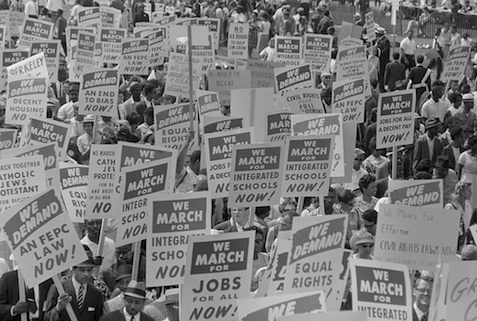
And the foreigners who join themselves to the Lord, to minister to him, to love the name of the Lord, and to be his servants, all who keep the sabbath, and do not profane it, and hold fast my covenant—these I will bring to my holy mountain, and make them joyful in my house of prayer; their burnt offerings and their sacrifices will be accepted on my altar; for my house shall be called a house of prayer for all peoples (Isaiah 56.6-7)
This is especially true of declarations of the prophets associated with the Messiah:
Arise, shine for your light has come and the glory of the Lord has risen upon you…. Nations shall come to your light, and kings to the brightness of your dawn (Isaiah 60.1, 3)
Sing and rejoice, O daughter Zion! For lo, I will come and dwell in your midst, says the Lord. Many nations shall join themselves to the Lord on that day (Zechariah 2.10-11)
This is where the arch of God’s mission, God’s journey with His people – all people – is headed.
But it can’t get there, O Israel…. It can’t get there, O Peter…. It can’t get there, O First Baptist… if you won’t enter the houses of the nations, if you won’t share the table with those outside the fold because you view them as Unclean.
God is directly challenging Peter’s piety because his piety is in the way of God’s purposes – of God’s dream for His people, for all people, indeed for all of creation.
“God is directly challenging Peter’s piety because his piety is in the way of God’s purposes – of God’s dream for His people, for all people, indeed for all of creation.”
The new orientation of life in Christ, the new economy of the Kingdom of God is love: God’s love for us, and our love for one another. That was the new commandment Christ gave His disciples on the eve of His crucifixion. “Love one another as I have loved you.” We can’t love others – especially as Christ loved us – and stay away from them because we deem them Unclean.
We might say that in Acts 11 God is reminding Peter that he is the one who stood up on the Day of Pentecost back in Acts 2 and quoted the prophet Joel:
In the last days, God declares, I will pour out my spirit on all flesh; your sons and your daughters shall prophesy, your old men shall dream dreams, and your young men shall see visions. Even on the male and female slaves, in those days, I will pour out my spirit (Acts 2.17-18 // Joel 2.28ff)
All flesh. And all means all. Even Gentiles. Even Gentiles like Cornelius, a centurion in that pagan Roman army that is occupying and oppressing Judea.
This is God’s purpose. This is God’s plan. This is God’s mission. This is God’s dream – that all people might come to His light, that all people might find the life that truly is life. This is the dream God calls His church and His disciples – people like Peter, like you, like me – to help fulfill. That call means the Holy Spirit will continue to push us, to challenge us, and to challenge our understanding of piety (your piety, and my piety), especially when it gets in the way of God’s dream.
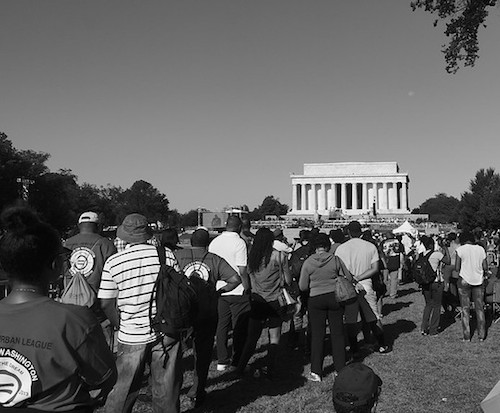
And one of the ways the Spirit continues to push God’s people is to engage the issues, the injustices, the challenges of our day. Jesus may have instructed us to go into our rooms to pray (Matthew 6), but He did not imply we should stay holed away in there. We cannot serve as instruments of God’s peace, we cannot live out God’s dream and keep to ourselves.
This is why the Spirit pushed Peter to Cornelius’ house: to serve as an instrument of God’s healing love, as an instrument of God’s dream. The division between Jews and Gentiles was one of the major stratifications of Peter’s day, which could not be allowed to stand if God’s dream was to be fulfilled.
I believe the Spirit is also what pushed Dr. King to ascend the steps of the Lincoln Memorial 50 years ago; it’s what motivated 250,000 people to fill the National Mall. Their faith wouldn’t allow them to sit idly by anymore and abide the injustices of a racist society – injustices that promoted hatred and division, that declared one race clean and another unclean. Jim Crow was one of the major divisions of their day. It could not be allowed to stand.
Peter could not remain silent any long. The Civil Rights marchers could not remain silent any longer. And neither can we.
“The Work of the MArch on Washington is still unfinished. The work of Pentecost…is still unfinished.”
For all the progress that has been made, the work of the March on Washington for Jobs and Freedom is still unfinished. The work of Pentecost, the work of the Holy Spirit on, in, and through the Church is also still unfinished – and both of these good works are entwined. How? We can’t do our part to help finish the work on either side simply by telling others God loves them. We have to help finish that work by loving them as Christ first loved us.
And we can’t say, I love you the way Christ first loved me…but it’s okay that a select few are compensated like kings while you (and a great many others) are paid a pittance for your hard work.
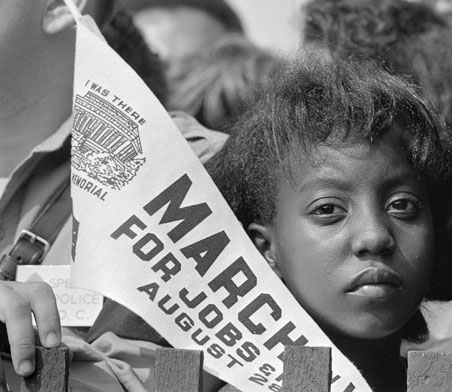
We can’t say, I love you the way Christ first loved me…but it’s okay that you can’t vote because you don’t have the right ID.
We can’t say, I love you the way Christ first loved me…but it’s okay that your child and 30,000 other children might die today from preventable disease.
We can’t say, I love you the way Christ first loved me…but it’s okay that you and hundreds of thousands more of our black and Latino brothers have been permanently disenfranchised by the industrial prison complex.
We can’t say, I love you the way Christ first loved me…but it’s okay that you and 50 million other Americans are hungry.
We can’t say that, because it’s not okay. And the Holy Spirit will push us to do something. Something.
From Moses to the Prophets down to Dr. King and right on down to you and to me, it has been God’s dream and deep desire that justice roll down like waters and righteousness like a mighty stream. But the reservoirs of injustice are dark and deep indeed. They were dark and deep 50 years ago, and they are dark and deep today. Most likely they will be dark and deep until this heaven and this earth pass away and all things are made new.
But from Moses to the Prophets down to Dr. King and right on down to you and to me, God has been sending His people to crack open the dam. Not by fighting fire with fire, not by giving as good as we get. That has only always added to the depths of the darkness. No. God sends His people to crack the dam with the strong, steady embrace of love – Christ’s love. No wall is high enough, hard enough, thick enough, or fortified enough to withstand that kind of pressure. The Holy Spirit proved that through the ministry of the early church that toppled an empire. The Holy Spirit proved that through the non-violent resistance of the Civil Rights Movement that toppled Jim Crow. And the Holy Spirit wants to prove it again – right here, right now by sending us against the deep darkness of our time.
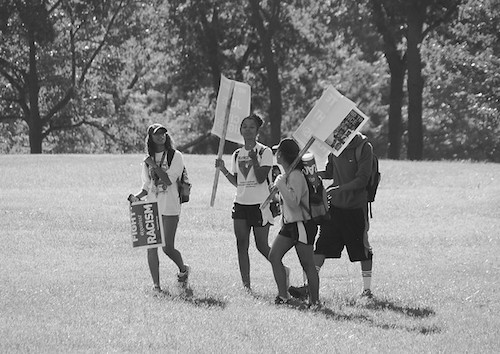
May we all, like Peter, have the courage to step down off our rooftops and step out on faith – to stand up, speak up, and reach out in the name of Christ to make room at the table of brotherhood (and sisterhood) for all of God’s people. That is where we will find freedom, find love, and find the life that truly is life.
Let us arise and let us shine, for our light has come – and the darkness does not overcome it.
Thanks be to God. Amen.

























